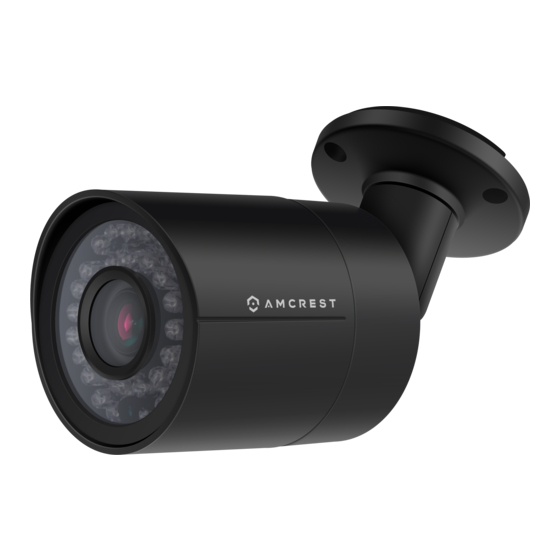Amcrest AF-2MBC-36B Gebruikershandleiding - Pagina 5
Blader online of download pdf Gebruikershandleiding voor {categorie_naam} Amcrest AF-2MBC-36B. Amcrest AF-2MBC-36B 9 pagina's.

Note: The wall anchors should be in the same bag as the screws and a designed to secure the screws onto the
mounting surface.
3) Attach the power and desired video cabling.
4) Thread the included screws through the base of the camera and into the wall anchors on the mounting surface.
Then, using a Phillips head screwdriver, secure the screws and base of the camera to the mounting surface.
Note: To adjust the camera, you can loosen the adjustment screws near the base of the camera. Adjust the
position as desired and tighten when complete.
Connection
This camera series will have three leads at the end of the wiring harness. Their functions are as follows:
Green: TVI,CVI,AHD, and CVBS
Red: DC12V, 2.0A power input
Black (Dip switches): Please follow the diagram below for configuration settings:
Note: If the proper mode configuration is not set, you will not be able to view your camera on your DVR. Please
make sure you have the proper settings on your camera before you begin setting up or installing.
To connect your camera to your DVR, please follow the steps provided below:
Note: Make sure you have the proper mode configuration on your camera before running or connecting any
cables. Refer to the Figure 1-1 for more details on how to set mode configurations for your specific DVR.
Step 1: Connect a BNC (coaxial) cable to the video out connection of your camera.
Step 2: Connect the male end of the DC power connector of the BNC (coaxial) cable to the female end of the power
connector of the camera.
Step 3: Connect the BNC (coaxial) cable to a video out channel on the back of your DVR.
Step 4: Connect the male end of the DC power connector of the power adapter to the female end of the power
connector of the BNC (coaxial) cable. Plug in the power adapter to apply power to the camera.
For more information on the installation process described, refer to the image below for more details.
Figure 1-1
5
